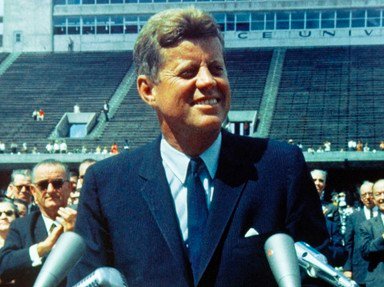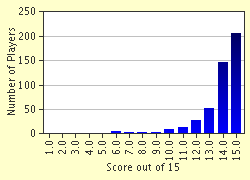Quiz Answer Key and Fun Facts
1. Where was John F Kennedy born?
2. What does the 'F' in John F Kennedy's name stand for?
3. John F Kennedy had been a sickly child most of his life, but this did not stop him from entering the Navy in WWII. While he was there, he suffered a terrible back injury. Due to his injury, he was later found to have a particular condition. What is that condition called?
4. John F Kennedy studied at Harvard and during his senior year he wrote a thesis called 'Why England Slept', which later was published as a book. This was not his only book. Whilst recovering from a back operation, he wrote another book, for which he received a Pulitzer Prize. What was this book called?
5. What was his wife's name, before she became Mrs Kennedy?
6. In what year did John F Kennedy win the presidential election?
7. Who did he beat when he won the presidential election?
8. One of the first problems Kennedy inherited from his predecessor was the trouble with Cuba. What is the name of the failed invasion mission that occurred in 1961?
9. There were still issues to be dealt with in Cuba. In October 1962, the world came to the brink of nuclear warfare, following a discovery of offensive weapons in Cuba. The threat lasted 13 long tense days. What was this dilemma known as?
10. In Kennedy's inauguration speech, he pledged to help those countries who were in need. Kennedy tried to keep this promise and set up a new organisation to give aid and man power to desperate countries. Volunteers were required for this. What was the organisation called?
11. There was another problem that Kennedy faced. After WW2, the Soviet Union and America had major issues with each other. Although there was no combat between these two nations, it was a very famous war. What was it called?
12. One major issue during Kennedy's presidency was in a European city that was divided between Communism and Capitalism. What was this city?
13. It took Kennedy a while to deal with domestic issues during his presidency. Many people have criticised Kennedy for this. But in 1963, he finally acknowledged the rising tensions for African-Americans and started to initiate a law to help. Unfortunately, he died before he could pass the law through, but Lyndon Johnson finally pushed the law through in 1964. What was this law called?
14. In 1963, Kennedy was preparing for re-election and whilst on a trip, he was brutally assassinated. Where was he visiting when he was shot?
15. Despite the many controversies surrounding Kennedy's assassination, a formal investigation into the shooting of the president was ordered. It was investigated by many of America's finest agencies, including the CIA and the FBI. The investigation was headed by the Chief Justice of the Supreme Court, Earl Warren. What was the investigation known as?
Source: Author
atomic32
This quiz was reviewed by FunTrivia editor
gtho4 before going online.
Any errors found in FunTrivia content are routinely corrected through our feedback system.

